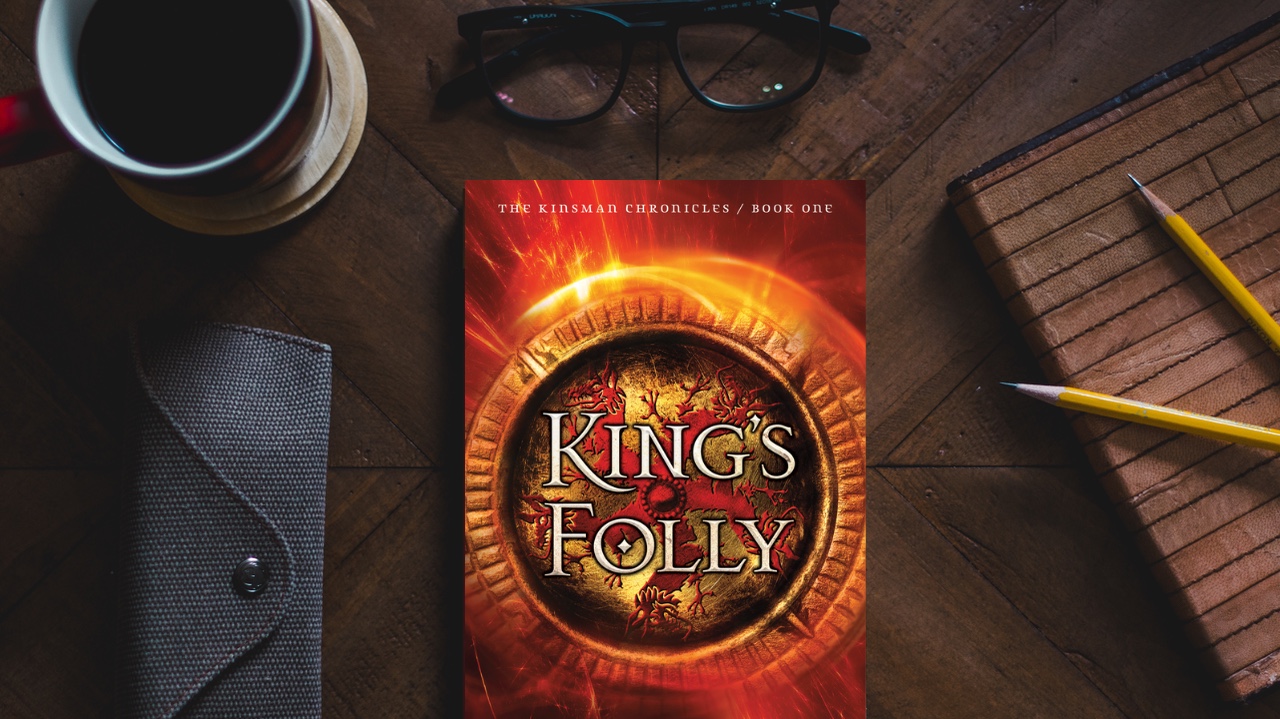In response to the immorality and idolatry of the five nations, the one true God Arman sends judgement through severe natural disasters called the Five Woes.
But the five nations do not understand this yet. Instead, they are caught up in political games and power struggles amid dealing with the first of the Five Woes. The king of the most powerful nation, Armania, vacillates to choose one of his three sons, Wilek, Janek, or Trevn, as his heir. Meanwhile, Armania’s enemy plots to kidnap Wilek and use him to fulfill a false prophecy. Subterfuge, schemes, and danger abound.
King’s Folly, the first in a YA fantasy series by Jill Williamson, is complex above all else. It contains nearly five-hundred narrowly spaced pages with over a dozen POV characters. All five nations are represented by one or more POV characters, and all major characters in the royal families and successions are introduced, along with their teachers, servants, guards, friends, etc. The book has an index of names, pronunciations, and roles to help keep them all straight.
With such a large cast comes a multitude of plots and subplots. The main plot is the struggle to return to the true God and escape the impending destruction. It is allegorical to the judgement of Israel, Judah, and the surrounding pagan nations in the biblical books of Kings, Ezra, and Nehemiah. The subplots involve the political squabbles among the five nations, the battle to rule within those nations, and the fight to merely survive the chaos.
King’s Folly is a Christian book, with Arman symbolizing God and Armania as Israel. But the plot focuses on a continent of people rejecting God and living in sin. To demonstrate their sin, the author had to show it clearly. Sexual immorality occurs. The author never described the scenes in detail, but the relations were insinuated for the sake of the plot. Idolatry, demon worship, human sacrifice, and drugs are prominent, though these are perpetrated by the villains.
All of that darkness is difficult to read at times. The tone is hopeful and the message uplifting, but the content is not recommended for readers under sixteen. Yet, the darkness is necessary to contrast man’s depravity with God’s holiness and create compelling enemies for the protagonists to overcome.
For some readers, however, the darkness and the complexity is overwhelming. So, ask yourself: Is this the type of book you want to write? Where the darkness is deep, and you have so many characters, plots, and subplots that you need a glossary to keep track of them? In my opinion, the book is expertly written. It takes an exemplary writer to pull off the strong message and realistic characters Jill Williamson did in King’s Folly. But the plot’s intricacy and controversial darkness remains. Is it right to write a Christian book with salient evil? I challenge you to read it. Think about it. And learn how to be a better writer by its example, whether you determine it to be good or bad.


This sounds like the kind of book I’d really love. I’ll have to check it out.
Awesome! Please do take a look.
I love this series. It’s exactly my kind of fantasy book, somehow. You should do a review of the second one, King’s Blood. It’s just as good and introduces the Bloodvoicing ability prevalent in Jill’s other Kinsman series.
Also Grayson 😉
I know, I read the second book! It’s awesome. And, yes, Grayson. And sea monsters! Not sure if I’ll be able to do a review of it on KP, but I did post a review of it on Goodreads a while back, if you’re interested: https://www.goodreads.com/review/show/1897794907
I can’t wait for Book 3!
Cool, thanks! I’ll read it then. I can’t wait for Book 3 as well!
I wish I was sixteen! Sounds really interesting. Have you ever read THE BARK OF THE BOG OWL, by Jonathan Rogers? It’s very different in tone and theme, but is also an allegory of sorts about Israel, though it focuses on David’s ascent to the throne. It’s spectacular, being one of the two books that sent a thrill through my veins as I read the last book in the series (the other being THE DARK IS RISING sequence by Susan Cooper). I cannot recommend it enough! I’m not sure if it would appeal to fans of KING’S FOLLY, but it might.
Also, I’m sorry, but it really annoys me that there is no way to italicize in comments. That’s why all my book titles are capitalized 🙂
I haven’t read either of those books yet, but it would seem that they are, in fact, on my to-read list on Goodreads. I’ve been looking for good, Christian fantasy and discovered them not too long ago. I’ll definitely check them out soon. A couple of allegories I love that are about Israel and the Early Church are RESISTANCE by Jaye L. Knight, PROPHET by R. J. Larson, and Jill Williamson’s other books BY DARKNESS HID and CAPTIVES.
And yes, you are correct about italics not being available. Very inconvenient when trying to write with error-free grammar.
Thank you for reading my review!
You’re welcome! I hope you enjoy Jonathan Rogers and Susan Cooper!
I’ve been wanting to read this series for awhile! Looking forward to buying all three! Book 3 is coming out 2018, but you apparently can pre-order it.